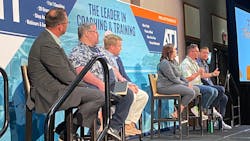ATI Fall Showcase: What to Expect from 2024 and Beyond (Diamond Partners Panel Discussion)
In a panel discussion derived from the 2023 Ratchet+Wrench Industry Survey, Chris Messer took to the stage with a handful of panelists from around the auto care industry to discuss the pain points facing shop owners in the current climate. Here's a look at the the questions and select answers from the panelists.*
Chris Messer: The technician shortage is real. What are you hearing from your customers who are successfully overcoming the lack of qualified technicians needed to run their business successfully?
John Eades: Think the best shops today what they're doing is they're hiring based on their values. They know that the quality of the values that they communicate at the beginning is the key. Sixty percent of turnover happens because we're hiring outside the alignment of our values. Most shops haven't taken the time to find what core values they're looking for. We're only looking for technical skills but technical skills are the easiest to train. It's the soft skills, the real skills, the values. We have people out of alignment with the values of our shop. I would highly recommend all of you to define what are we looking for in people. What are the values that we're looking for in the interview process? I think you're going to find the longevity and stickiness of your employees to stick around when you hire based on values.
Chris Messer: Inflation is real and costs are rising across the board. What are your customers doing to mitigate expenses and ensure resources are being applied effectively?
Lauren Briggs: I get a unique perspective being at NAPA. A lot of our members taking advantage of more of our cost-saving programs, things like private system health insurance discounts. We are seeing the number of members raise labor rates because they have to make up for that somewhere. And that's where offering things like consumer financing is so important because then you're offering your consumers an option to be able to bear increased costs. It's a fact of where we're at right now economically. Parts are getting more expensive for the distributors, which means your prices have to go up.
Chris Messer: As Bill Hanvey presented yesterday, the Right to Repair Act affects the aftermarket on many different levels. What are your customers saying? Are they turning down work they can't get repair information for? How do you suggest we overcome?
Connor Tracy: Rather than work that we have to turn away, it's the work that we could potentially be performing incorrectly that leaves us open to issues. We shared at ADAPT a couple of years ago that story about a Toyota. They performed alignment on this Toyota. They didn't reposition the basic camera using an ADAS recalibration. The vehicle attempted to either lane change or automatic brake. It subsequently got in an accident. The shop was subject to a lawsuit. We want to service the customers right. We always want to take care of that vehicle properly. So, there could be potential issues with servicing something incorrectly from purely just not knowing (better).
Chris Messer: Vehicle design and technology advancements are running at a rapid pace. how are your customers ensuring that their staff is equipped with the training and tooling to fix the modern vehicles they are seeing at their shops?
PJ Leslie: When I go out and visit shops, it's like 1 in 50 is involved in any form of training as a shop owner and then service—the front of the house— almost never, and that blows my mind. So one of the things that I think that is a big gap today in our industry is we train our techs constantly. They're always having to be up to date on new models that are coming out and new diagnostic tools. We invest so much in training the back of house, but then we don't do any training on the front of house. I am starting to see more sales-related trainings and it's essentially to teach the front of house how to communicate with customers.
Connor Tracy: I'm probably preaching to the choir about training, but really getting the technician training in these advanced systems. I know that there's a ton of it out there with our parts vendors. Most of them have partnerships with Garage Gurus or some of their vendors where they can provide training to you so you don't necessarily have to go off-site. Training events like VISION or ASTE are great because they come together outside of the shop environment. Also, I know a lot of local shop organizations will get together and do their own training. Maybe there's a guy in the dealer world and he knows about ADAS systems and they'll come together and do training. It's a little piecemeal, there's nothing that's really the place to go for that kind of training. So you're going to have to do your research.
Chris Messer: How many people have heard of RYR? Raise your rate was started as a conversation in the ASGO (Auto Shop Owners Group) on Facebook in 2019 and continues to be a hot topic of discussion. What are your customers doing to combat low labor rates and capture more revenue for their shop?
Connor Tracy: I think the biggest conversation point over raising rates that I've seen recently in a lot of shop owner forums and having a lot of conversations is a lot of shop owners struggling to charge appropriately for diagnostic time. I think for general service we're really getting there ... I know a lot of coaching organizations look at effective labor rate for those types of things. Also, you need to look at your expenses. If in the next year, I can estimate that I'm going to do X amount of diagnostic work but I've got to spend $50,000 for an ADAS recalibration system, then what do I need to be charging to get to that cost in that GP that I need? I think we do a lot by the seat of our pants, but really analyzing what is my expenditure going to be looking forward rather than what I have right now. And then setting that labor rate.
* Some answers have been edited for clarity.




